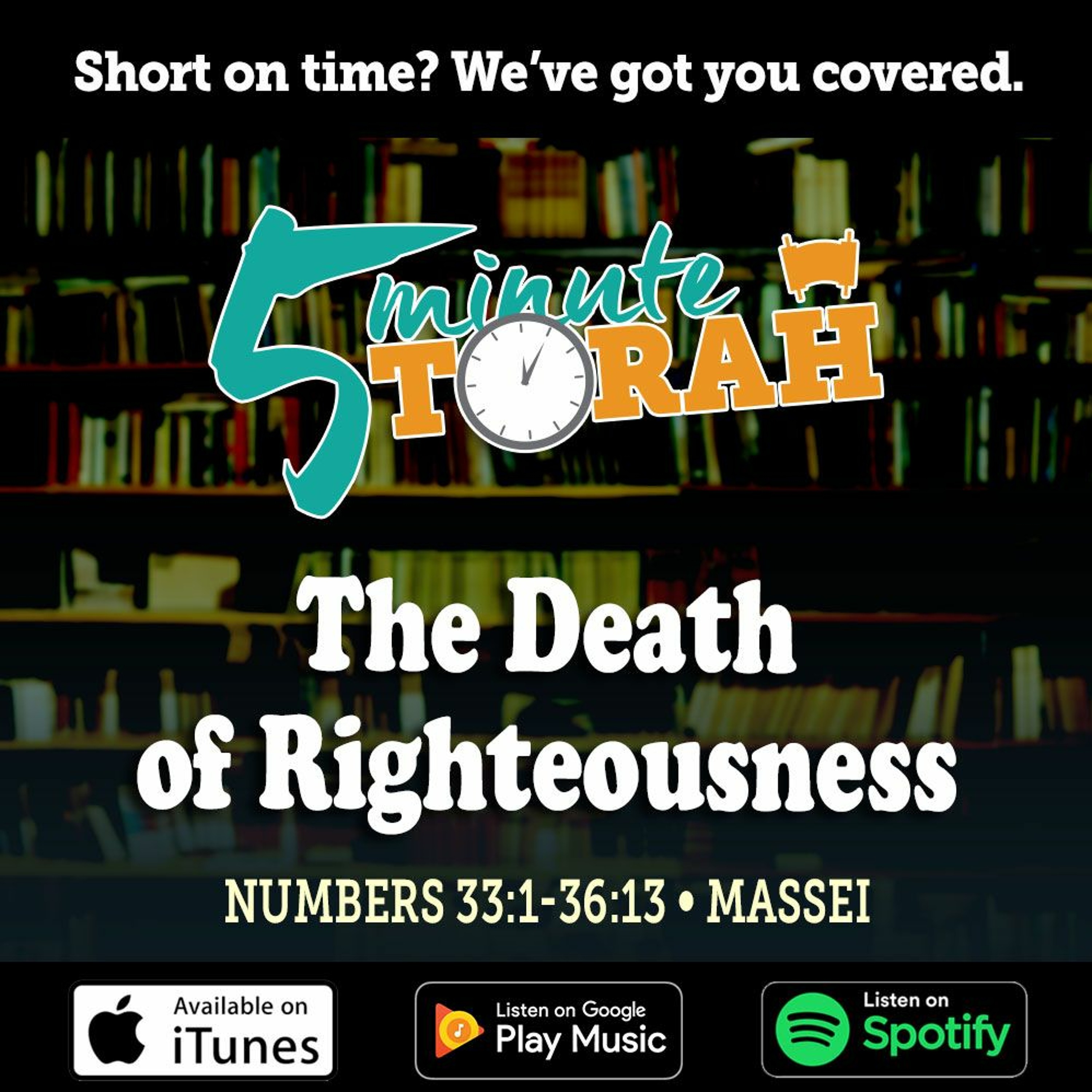Episode Transcript
[00:00:00] Speaker A: Fear. Fear is a powerful motivator. It can make you run from one thing to another. It can also protect you from things that might harm you. But when it comes to fear of God, there are many different perspectives. When someone mentions the fear of God to you, what images come to mind? A charismatic hellfire and brimstone preacher screaming at the top of his lungs. A sermon by Jonathan Edwards about sinners in the hands of an angry God, an abusive father, or a controlling relationship. We all have our ideas of what the fear of God is and isn't. But what do the scriptures themselves have to say about it? And is there a fear to conquer fear? Let's take a look at this concept together in this week's five minute Torah.
This week, we're studying the portion of Yitro Exodus 18 one through 2023, and here are the three things that you need to know about it. Number one, the wisdom of Jethro and the proto Sanhedrin. At some point during the showdown between Moses and Pharaoh, Jethro had come back and taken Moses'wife and children back to Midian with him. Once the children of Israel had been released, Jethro meets Moses in the wilderness with his wife and children. When he sees everyone standing all day, waiting their turn for Moses to make a ruling in their civil and religious cases, Jethro tells his son in law that he's not only going to wear himself out, but he's going to wear out the Israelites as well. So he proposes that Moses set up a chain of command. There would be those who would be judges over thousands and hundreds, and case was too difficult for them. It was to be brought to Moses himself. Jethro describes the type of men he is to choose as capable men from all the people. Men who fear God, who are trustworthy and hate a bribe. Exodus 1821. Moses takes his father in law's advice and establishes a system of leadership and justice in Israel, freeing up Moses to do all that God required of him, setting the stage for the future Sanhedrin that would essentially be the supreme court of Israel. Number two, Har Sinai, up on the mountain. Coming into the presence of the God of the universe is a big deal. When God summoned Moses to the mountain, it was serious. He gave specific instructions as to how the Israelites were to treat the experience with the proper sanctity. Go to the people and consecrate them today and tomorrow, and let them wash their garments and be ready for the third day. For on the third day, the Lord will come down on Mount Sinai in the sight of all the people. And you shall set limits for the people all around, saying, take care not to go up into the mountain or touch the edge of it. Whoever touches the mountain will be put to death. No hand shall touch him, but he shall be stoned or shot. Whether beast or man, he shall not live. Exodus 1910 through 13 from this and our commentary in just a little bit, we can see that coming into the Lord's presence is a bit like playing with fire. Get careless and you will undoubtedly be burnt. If only we had that kind of healthy respect for the omnipotent creator today.
And number three, the Ashleet Hadavarim, the Big ten. The whole reason God brought israel to the mountain was so that he could enter into a marriage covenant with them. He was the husband, and they were his bride, with the Torah being the marriage contract. But the Torah wasn't given to be a legalistic set of rules that oppressed the children of Israel. God had just delivered them from slavery. Why would he turn it right back around on them? No, the Torah was given for a purpose. Our Torah portion says now therefore, if you will indeed obey my voice and keep my covenant, you shall be my treasured possession among all peoples, for all the earth is mine, and you shall be to me a kingdom of priests and a holy nation. Exodus 19 five God's plan for Israel was that they would stand out from among all the other nations of the earth as a nation that is holy and set apart for his service. The asaret had varim the literally the ten words, or the ten Commandments as we call them in English, are the famous face of the Torah's commandments. But there are another 603 waiting to be discovered in our Torah studies.
[00:04:30] Speaker B: Have you started preparations for Passover? It may seem like a long way away, but it will be here before you realize it. Well, if you're looking for Passover resources, I've got a few things that could help. First, I've got a bundle of helpful tips and articles you can download for free to help you with your Passover preparations. You can get all of these great resources absolutely free by simply signing up for my mailing list using the link in the description box below. Just fill in your info, hit subscribe, and you'll be given a link to download my Passover resource kit. No spam, no double mailings. Just enjoy the resources included in this bundle. Next, I have an original song for Passover that you and your family can learn and sing together at the Passover table. It's called the Mageed Song and it gives the basics of the Passover story with a catchy melody that you'll be humming for weeks after your seder. Just use the link below or at the end of this video to check it out. Last, you can pick up a copy of cup of Redemption, my messianic Passover Hagada to evaluate for your seder. It has a 4.6 star rating and over 70 reviews on Amazon, so grab your copy and see if it's a fit for your family and your Passover table. The link is in the description box below.
[00:05:42] Speaker A: This week's Torah commentary is called should we fear God? And comes from my book five minute Torah, volume two. Our current Torah portion contains one of the most famous sections of the entire Bible, the Ten Commandments. These ten words, as they are literally translated, as I said earlier, are the pillars of both Judaism and Christianity. They form the basis of our Judeo christian value system. Moses climbed to the top of Mount Sinai to receive God's covenant. The children of Israel had been waiting for this moment since their exodus from Egypt. They weren't waiting for just ten Commandments, but for all 613 commandments contained in the Torah, the full revelation of God, who redeemed them from the house of bondage. However, when the children of Israel saw the awesome display of God's glory at Mount Sinai, they were immediately filled with fear. Now, when all the people saw the thunder and the flashes of lightning and the sound of the trumpet and the mountains smoking, the people were afraid and trembled, and they stood far off and said to Moses, you speak to us and we will listen, but do not let God speak to us, lest we die. Exodus 2015 through 16 this is the first and last time in history that an entire people would see what is normally only heard. They were seeing unbelievable things, and it scared them stiff. How did they respond? They told Moses, we need you to be the buffer between us and God, because if we hear him anymore, we will die. They had an extreme fear of the very one who had delivered them from Egypt. This brings us to an important question. Should we fear God? Many people quote the words of John there is no fear in love, but perfect love casts out fear, for fear has to do with punishment. And whoever fears has not been perfected in love. This is from one John 418. They say that followers of Yeshua should not fear God. However, Yeshua told his disciples, do not fear those who can kill the body but cannot kill the soul, rather, fear him who can destroy both soul and body in hell. Matthew 1028 these two scriptures sound like they're at Ods with one another. The solution is that the fear of the Lord should be properly placed. Moses knew that the fear the children of Israel had was an unhealthy one. He didn't want to remove it, but to properly redirect it, he told them, do not fear, for God has come to test you, that the fear of him may be before you, that you may not sin. Exodus 2017 notice that immediately after telling them, do not fear, he told them that they should fear God. However, they needed to realize that God's plans for them were not malevolent and that a healthy fear of the Lord was the key to give them a healthy fear of sin. Rabbi Haninah Bendosa taught his disciples a similar principle. He in whom the fear of sin takes precedence over wisdom, his wisdom will endure. But he in whom wisdom takes precedence over fear of sin, his wisdom will not endure. I vote 38. How does this work? Let's look at an example from the midrash. King Solomon was the wisest of all men, but he fell prey to sin. How so? The midrash tells us that when he was writing his copy of the Torah, as all kings were required to do, he altered the text to permit himself to disobey the commandment prohibiting a king from having too many wives. The commandment of the Torah reads, and he shall not acquire many wives for himself, lest his heart turn away. Deuteronomy 1717 why did he do this? Solomon believed he understood the reason the Torah gave the commandment so that his heart would not go astray and consequently thought his superior wisdom would keep him from being entangled in this particular sin. In other words, his wisdom took precedence over his fear of sin. Therefore, his wisdom failed, and he ended up exactly where he believed he would not. Fear of God is a trait that requires extreme balance in a person's life. If we throw out the fear of God, we will end up like Solomon, in a place we'd never dreamed we would be. On the flip side, however, we can have a fear of God that cripples us. Like the Israelites at Mount Sinai, the middle road is the path Moses took. He knew that a healthy dose of the fear of the Lord is a deterrent to sin and will put us into a right relationship with our redeemer. In this case, a good dose of healthy fear can actually conquer the wrong kind of fear. While an unhealthy fear of God can cripple us or misguide us, a healthy fear of God can empower us to live up to our calling. May we all have a healthy fear of the Lord that empowers us to overcome sin and gain wisdom from our redeemer. What's your story? Which side of the fear spectrum have you been on the majority of your life? And where are you now? I would love to hear your story. I'll see you again soon with another messianic insight into the eternal Torah of God. Blessings from Amit Hatorah.


